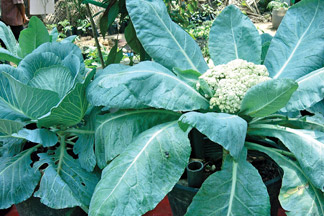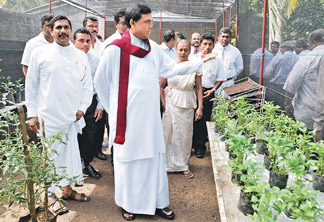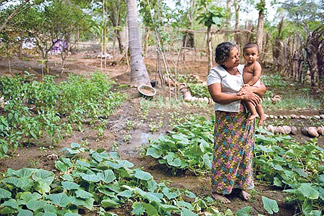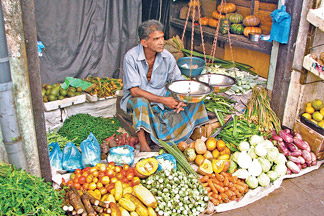|
Household income to increase:
Divi Neguma to benefit more families
By Dhaneshi YATAWARA
 Eliminating poverty is the biggest challenge any government, would
face amidst the heavily fluctuating prices of the world consumer market.
In such a backdrop rather going on mass scale it sounds more effective
to strengthen the smallest unit of the society, the family. The stronger
this unit is the stronger the society would be. Eliminating poverty is the biggest challenge any government, would
face amidst the heavily fluctuating prices of the world consumer market.
In such a backdrop rather going on mass scale it sounds more effective
to strengthen the smallest unit of the society, the family. The stronger
this unit is the stronger the society would be.
In such a situation the Divi Neguma national development drive is a
timely initiative to face the challenges of the modern world.
Strengthening people to face high cost of living and gaining food
security the Divi Neguma is expanding its wings to serve more people who
have less resources to live.
This year the Government plans to develop 2.5 million homes as
individual units under the Divi Neguma program.
 Amidst its wide scope the Divi Neguma program has helped boost
vegetable production, said Economic Development Minister Basil Rajapaksa
launching the new initiatives of the Divi Neguma program. Amidst its wide scope the Divi Neguma program has helped boost
vegetable production, said Economic Development Minister Basil Rajapaksa
launching the new initiatives of the Divi Neguma program.
"It is important to keep the prices of the food low since people
spend a significant part of their income on essential items. It is a
part of lowering the inflation levels of the country," Minister
Rajapaksa added.
"Through Divi Neguma we plan to strengthen the family unit
economically and make them self sustainable", the Minister said. With a
fresh hope of a new phase the Economic Development Ministry has declared
March as a special planning month for the Divi Neguma program.
Officials of the Divi Neguma program will visit selected households
of a Grama Niladhari Division and discuss with the family of its
potentials, strengths and weaknesses.
Under the new phase households of 14,000 GN divisions will be covered
where teams under the Grama Niladhari, Agriculture Research Assistant
and the Samurdhi Officer will visit each family.
The team will comprise officers with expertise in agriculture,
agrarian services, agriculture management, etc. The team will analyse
the present state of the agricultural land of the family and proper
changes to develop its productivity.
According to the ministry nearly 2.1 million families had joined the
Divi Neguma program in 2011 and the government hopes to increase this to
2.5 million domestic units this year. Minister Rajapaksa said the total
income earned by the tourism sector this year had exceeded US dollars
one billion and the income earned by the foreign employment sector too
had increased by 30 percent this year. "However, it is regrettable to
note that a large amount of foreign exchange had been spent on
importation of food items which could be grown locally.
The import of dried chillies cost nearly US dollars 50 million," he
added.
An accelerated program was necessary under the Divi Neguma to save
the money drained out on such imports and make it available to local
farmers.
Agri, agrarian services, minor export crops and other units linked to
the Divi Neguma project should make suitable proposals to make this a
success.
 In the recent developments Divi Neguma accelerated the 'one project
for one village' program in the Hambantota district in 576 villages. At
the same time four villages in the district will be developed under the
Pura Neguma program. In the recent developments Divi Neguma accelerated the 'one project
for one village' program in the Hambantota district in 576 villages. At
the same time four villages in the district will be developed under the
Pura Neguma program.
The project proposals of Local Government members as well as
Parliamentarians in the area will be selected for this purpose.
The government has taken measures to select one village among several
developing villages and develop it to the level of a town under the Pura
Neguma program.
In the Badulla district village development programs were launched
recently at a cost of Rs. 567 million through the Economic Development
Ministry.
In addition at a cost of Rs.340 million infrastructure of several
villages will be developed. To upgrade nine villages in the district as
towns the Ministry through Pura Neguma program has allocated funds.
These projects will be launched through the Local Government and
Provincial Council Ministries. Accordingly, 874,000 people in 1,991
villages coming under 567 Grama Niladhari Divisions in the Badulla
District's 15 Divisional Secretariat areas will benefit from these
accelerated development programs.
The government will be spending Rs. 450 million to develop nine
villages of the Ridimaliyedda, Meegahakiwula, Kandeketiya, Haldummulla,
Uva Paranagama, Bandarawela, Lunugala, Haputale and Badulla Local
Government bodies as towns by the Local Government and Provincial
Council Ministry.
Under this program each village will get a main bus stand, building
for weekly fairs, public playground, library, Pradeshiya Sabha building,
public toilets, pavements, public cemetery and a drainage network among
other facilities. The number of Samurdhi beneficiaries in the district
is 63,268 which is 27 percent of the district's population.
In addition allocations were made to Ratnapura and Kegalle districts
to develop the GN divisions of each of these districts.
The Government has allocated Rs. 1,603 million for the accelerated
development of 575 Grama Niladhari Divisions of 17 Divisional
Secretariat areas in the Ratnapura district.
This would be Rs.575 million for the 'One-Project-for-One-Village
program', Rs. 628 million for the ministry's second project for
community development and improving people's livelihoods and Rs. 400
million for the Town Development Project of the Local Government and
Provincial Councils Ministries.
According to the ministry statistics this would benefit the
district's 1,098,808 people including rural communities comprising 81
percent of the population and those in plantation sector comprising 10
percent.
These projects would also be a boon to Samurdhi beneficiaries who
comprise 43 percent of the population and help reduce the unemployment
rate which currently is at 5 percent.
 The Government has decided to develop eight villages as towns in the
district's Pradeshiya Sabha areas of Ayagama, Imbulpe, Kolonna,
Embilipitiya, Pelmadulla, Balangoda, Kahawatta and Ratnapura under the
Pura Neguma program at a total cost of Rs. 400 million. Under the
program each village will get a bus stand, building for a weekly fair,
public playground, library, Pradeshiya Sabha building, public toilets,
pavements, public cemetery and a drainage system among other facilities.
The local government areas to which the villages belong were decided at
this meeting. The Government has decided to develop eight villages as towns in the
district's Pradeshiya Sabha areas of Ayagama, Imbulpe, Kolonna,
Embilipitiya, Pelmadulla, Balangoda, Kahawatta and Ratnapura under the
Pura Neguma program at a total cost of Rs. 400 million. Under the
program each village will get a bus stand, building for a weekly fair,
public playground, library, Pradeshiya Sabha building, public toilets,
pavements, public cemetery and a drainage system among other facilities.
The local government areas to which the villages belong were decided at
this meeting.
These projects would also boost district's main sources of income
such as paddy, tea and rubber cultivations as well as small industries
including gem and jewellery, handicraft and coir industries.
In Kegalle, benefiting 818,000 members of 211,000 families in 1,677
villages in the district development program will be implemented at a
cost of Rs. 573 million. It will benefit comprising 11 secretariat
divisions belonging to Dedigama, Galigamuwa, Aranayaka, Kegalle ,
Rabukkana, Ruwanwella, Deraniyagala, Mawanella and Yatiyantota
electorates. The total amount the government allocated in 2011 for the
Kegalle District was Rs. 8,201 million.
Of this amount Rs. 1,564 is from the Economic Development Ministry
funds. Hitherto the poverty level percentage per household in the
district was 16.6 percent, which dropped to 10.8 percent last year. The
number of families receiving Samurdhi benefits is 75,554.
The projects will cover minor irrigation channels, drinking water,
roads, extension of rural electricity, development of schools including
provision of toilets, pre-schools, health and maternal clinics,
development of children's playgrounds and other playgrounds, developing
service centres for small industries and traditional industries,
modernising paddy and fertiliser storage facilities, environmental
protection and forest conservation.
The above development schemes will help in improving tourist
locations in the district such as the Pinnawela Elephant Orphanage,
Kithuglala and waterfalls including Esupini falls and archaeological
sites such as the Dedimunda Devale. The Ministry hopes that this
development will increase tourism's contribution to the district's gross
domestic production by seven percent. Consequently it will also improve
the living conditions of nearly thousand families engaged in the area's
small industries - kitul treacle production and clay industry.
The government has relaxed regulation related to obtaining permits
for Kitul tapping to boost the Kitul industry. The Economic Development
Ministry has taken steps under the Divi Neguma Program to increase the
Kitul trickle and Jaggery production and to develop the industry.
It is expected that a large number of people will join the industry
due to the training program and equipment distributed by the Divi Neguma
Program.
Funds have also been allocated to provide tool kits to those engaged
in the industry through Divi Neguma with the assistance of Small Export
Crops Development Ministry, the Traditional and Small Enterprises
Development Ministry and the Industrial and Commerce Ministry. Sri Lanka
has always been a country of villages.
Our village, while retaining its strengths and impressive features,
can be developed as a micro centre of growth - with the vision that
village has to be decent and comfortable place for people to live, work
and engage in their cultural and communal activities. Nearly 55 percent
of the regional contribution to the national economy is coming from
regions out of the Western Province, according to the Economic
Development Ministry. |

